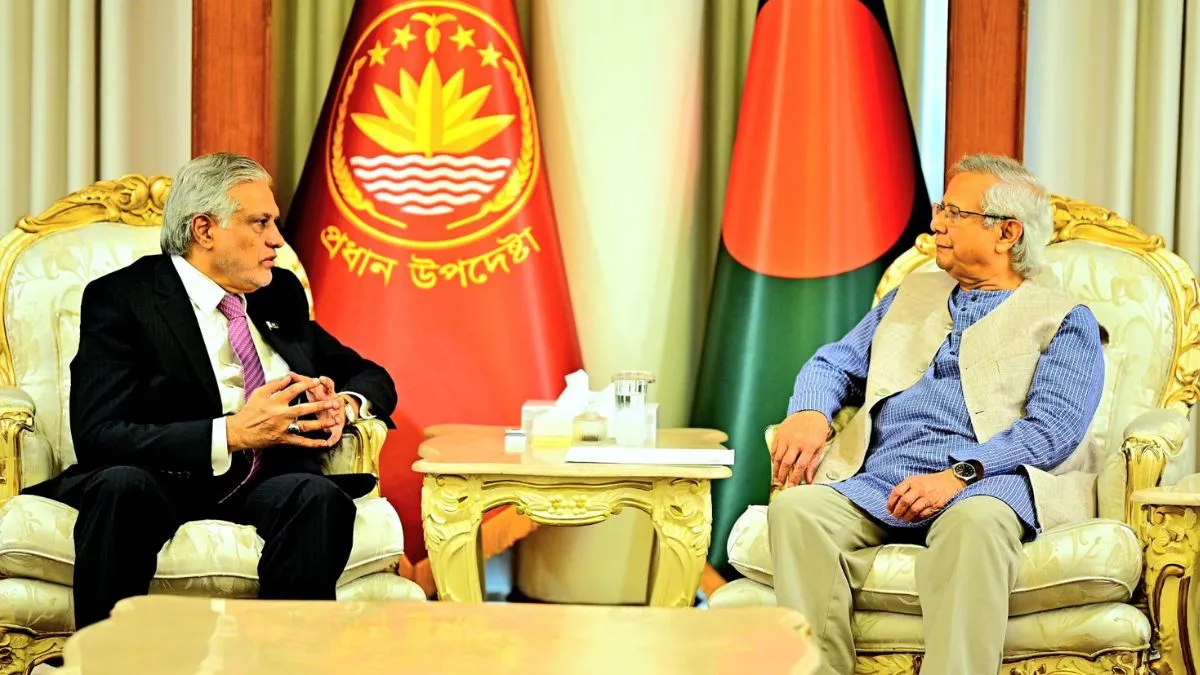- By Supratik Das
- Mon, 25 Aug 2025 09:20 AM (IST)
- Source:JND
Ishaq Dar Dhaka visit: Pakistan’s Deputy Prime Minister and Foreign Minister Ishaq Dar and Bangladesh Foreign Affairs Adviser Md Touhid Hossain appeared at odds over whether long-pending disputes stemming from the 1971 Liberation War have been resolved, underscoring the continuing strain in bilateral ties despite fresh efforts to strengthen cooperation.
Dar claims 1971 issues were ‘settled’
Dar, who is the most senior Pakistani leader to visit Dhaka in more than a decade, insisted that the disputes between the two countries were addressed on multiple occasions in the past. He pointed out that the first resolution came in 1974 during the tri-partite talks that involved India, and a second time when then-President Pervez Musharraf publicly addressed the matter during his visit to Bangladesh. According to Dar, Musharraf had spoken “with an open mind” and showed a willingness to move forward, which, in his view, constituted a settlement of genocide-related concerns.
Bangladesh rejects Pakistan’s claim
Md Touhid Hossain, however, firmly disagreed. Speaking to reporters, he said it was unrealistic to expect that decades of unresolved grievances could be wrapped up so easily. “Definitely, I don’t agree with Dar. If that had been the case, the problems would have been solved. We explained our position, and they explained theirs,” Hossain was quoted as saying by Bangladesh daily Prothom Alo. Hossain underlined that unresolved issues continue to overshadow relations, including Bangladesh’s longstanding demand for a formal apology from Pakistan for the atrocities committed during the 1971 Liberation War, the division of pre-independence assets, the transfer of foreign aid meant for cyclone victims of 1970, and the repatriation of stranded Pakistanis.
Bangladesh’s Ministry of Foreign Affairs released a statement after the bilateral talks, reaffirming Dhaka’s demand for “a formal official apology for the genocide committed in 1971.” It added that resolving these historic issues was essential for building “a solid foundation for enduring and forward-looking bilateral relations.” This was not the first time Dhaka raised the issue this year. In April, the Bangladeshi government formally asked Pakistan to apologise and to settle the question of asset sharing, calling them “unresolved legacies of history.”
Fresh Agreements Signed Despite Differences
Despite the friction over history, both sides made progress on the diplomatic and economic front during Dar’s two-day visit, held from August 23 to 24 at the invitation of the Bangladeshi government. Bangladesh and Pakistan signed one bilateral agreement and five memorandums of understanding (MoUs). The agreement included a visa waiver for holders of diplomatic and government passports from both countries.
The MoUs focused on boosting cooperation in multiple fields, including the establishment of a joint working group on trade, cultural exchange programmes, collaboration between the two foreign service academies, enhanced cooperation between state news agencies, and linkages between Bangladesh Institute of International and Strategic Studies (BIISS) and Pakistan’s Institute of Strategic Studies Islamabad (ISSI).
Ahead of Dar’s visit, Pakistan’s Commerce Minister Jam Kamal Khan met Bangladesh’s Commerce Adviser Sk Bashir Uddin in Dhaka to explore ways of strengthening bilateral trade and investment. Both sides discussed opportunities to enhance economic cooperation, particularly at a time when South Asia is facing major shifts in trade patterns due to global uncertainty.
Long Strained Ties
Relations between the two nations have often been turbulent since Bangladesh’s independence in 1971. Ties dipped further under Sheikh Hasina’s government, which consistently pressed Islamabad for an apology over the 1971 genocide. The situation changed after Hasina was ousted in August 2024 following widespread student protests. The new Mohammad Yunus-led administration seeks to re-engage Pakistan on multiple fronts.
Ishaq Dar’s visit marks a fresh chapter in Pakistan-Bangladesh engagement, as it is the first by a Pakistani foreign minister since Hina Rabbani Khar in 2012. However, differences over historical accountability remain a stumbling block. Both Dhaka and Islamabad have agreed that strengthening people-to-people links, expanding trade, and building trust are essential for moving relations forward.
With inputs from agencies.
